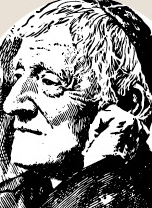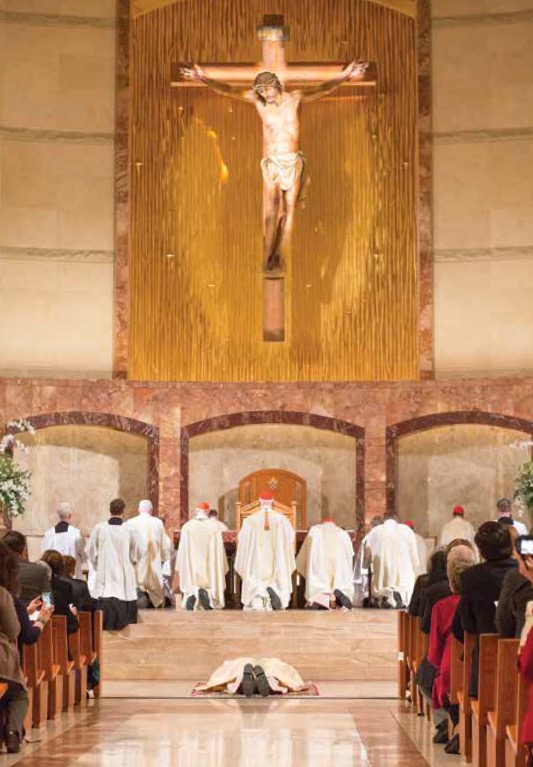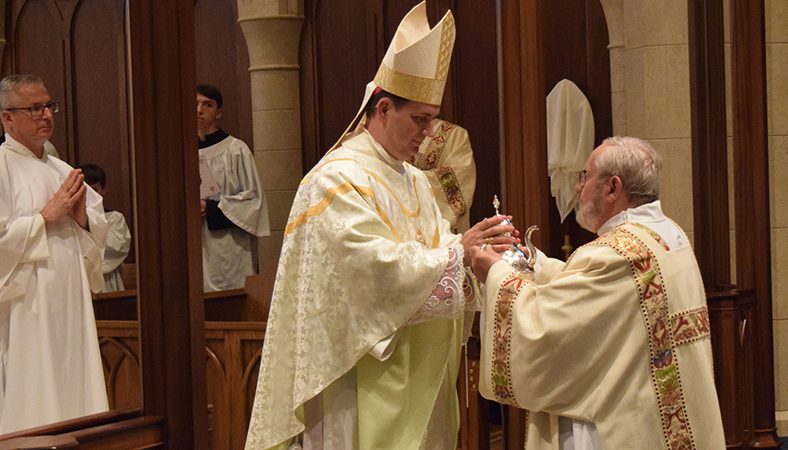Efficacious in Deeds, Gentle in Ministry, Constant in Prayer
Understanding diaconal ministry in the Ordinariate of the Chair of St. Peter
Bishop Steven J. Lopes Comments Off on Efficacious in Deeds, Gentle in Ministry, Constant in Prayer
There was more than a little nervous energy in the chancery conference room on a Wednesday morning in late June. Nine novice preachers were about to break into small groups to deliver a funeral homily for which they were given only one evening to prepare. These nine men are candidates for the permanent diaconate for the Ordinariate of the Chair of St. Peter and were gathered in Houston for the annual diaconate formation intensive, a full week of classes, practica and fellowship in Christ.
In 2009, the Holy See issued an apostolic constitution entitled Anglicanorum coetibus establishing the ordinariate, a nonterritorial diocese in the United States and Canada for parish groups originally of the Anglican tradition that have entered into full communion with the Catholic Church. This structure gives concrete expression to the ecumenical vision of Pope Benedict XVI: a corporate way for inviting parishes and communities from a Protestant tradition into full communion with the Catholic Church. The apostolic constitution itself revolves around a very clear and important ecumenical principle: the unity of faith allows for a vibrant diversity in the expression of that same faith. Three ordinariates thus far have been established in England, in North America and in Australia and, over the course of the last 10 years, have worked to develop their own ecclesial life and structures.
For his part, Pope Francis has taken the principle of the unity of faith allowing for a diversity of expression and given it even more concrete parameters. It is he who authorized our distinctive liturgy and promulgated “Divine Worship: The Missal” for the celebration of holy Mass for the ordinariate communities. During the same week in 2015 in which the Divine Worship Missal was first authorized for use, the pope appointed the first bishop of the Ordinariate of the Chair of St. Peter, thereby demonstrating that the ordinariates truly are particular churches equivalent to dioceses.
As always with Pope Francis, his clear intention is that the ordinariate is meant to be evangelizing, an enrichment to Catholic life and a beacon of hope drawing other people into the fullness of Catholic communion. We can say, therefore, that the purpose of the ordinariate is to provide a lively expression of Catholic life nourished in the traditions of English Christianity. And this lively expression is attractive, showing an ecumenical model of true unity that does not sweep away elements that give an ordinariate parish community its distinctive identity.
Ministry of Deacons
From the outset, the ministry of deacons has been at the center of this ecumenical project. Currently there are 11 permanent deacons in the ordinariate, many of whom have previous experience in ministry in a Protestant context. The nine men in formation for the diaconate represent the ordinariate’s first deacon cohort: men who have discerned a vocation to diaconal service as Catholics in an ordinariate parish. Indeed, this class of men in formation is truly a sign of the fruitfulness of parish life.
The geographical expanse of the Ordinariate of the Chair of St. Peter brings many challenges, not the least of which is arranging a cohesive formation program, for those preparing for diaconal service. There are currently 42 parishes and missions in the ordinariate throughout North America. Like the parishes of the ordinariate itself, the deacon candidates are drawn from across North America: two from the cathedral parish in Houston, while others come from Mobile, Alabama; Philadelphia; Ottawa; Toronto; Fort Worth, Texas; Orange County, California; and Washington, D.C. While the parishes are widely spread, they share an important ethos of having been formed in the language, liturgy, spiritual traditions and pastoral experience of English Christianity.
The nine men in formation represent a breadth of parish experience. Each of their communities in some way expresses a group of faithful who have come into full communion with the Catholic Church. Initially, these communities are often small, a bit fragile and lacking in resources as they begin their Catholic life. They truly have left all to follow where their conscience has led them.
Yet these communities also possess a missionary zeal, an appreciation for the depth and beauty of Catholic faith, and can articulate a powerful personal story about how faith and the life of the Church are worth great sacrifice. Ordinariate deacon candidates are first formed by this experience of Catholic life, and come to see their vocation to ordained service as a way to provide their new parish community with stability and leadership in its foundational years. In several cases, our deacon candidates live in communities without a resident ordinariate priest, so they will be a stable ordained presence in the parish after ordination to the diaconate.
Diaconal Formation
But the practical problem of diaconal formation still remains, because the ordinariate encompasses all of North America! Each deacon candidate follows an academic program through St. Mary’s Seminary in Houston. This program was first established for the more rural dioceses in Texas, and it offers courses taught “live” at the seminary and then live-streamed to the other candidates for whom weekly travel to Houston is not possible. There are limitations to the technology, of course, but this does allow at least the academic portion of formation to be made available to a wider audience. Formation advisers at the seminary track the progress of each candidate, offering advice and counsel along the way.
The ordinariate itself supplements academic formation by gathering all of the deacon candidates for a weeklong intensive formation course each June. Even the opportunity to come together as a group is valuable, allowing our candidates to pray together, share the experiences of their parishes and engage in common formation for a common mission. Formation weeks all include some course work, liturgical and sacramental practice sessions, theological discussion and pastoral application.
………………………………………………………………………………………………………………………………………………………………………..
Pope to canonize John Henry Newman
 The Personal Ordinariate of the Chair of St. Peter website notes that when the pope canonizes John Henry Newman on Oct. 13, he will be the first English person who has lived since the 17th century officially recognized as a saint by the Catholic Church. Newman was a member of the clergy in the Anglican tradition before converting to Catholicism.
The Personal Ordinariate of the Chair of St. Peter website notes that when the pope canonizes John Henry Newman on Oct. 13, he will be the first English person who has lived since the 17th century officially recognized as a saint by the Catholic Church. Newman was a member of the clergy in the Anglican tradition before converting to Catholicism.
In 2005, Father Steven J. Lopes was named an official of the Congregation of the Doctrine of the Faith, the Vatican office responsible for promoting and preserving Catholic teaching. For seven of his 10-plus years at the Vatican, he served as secretary to the cardinal-prefect. Pope Francis named him a bishop on Nov. 24, 2015.
………………………………………………………………………………………………………………………………………………………………………..
Themes
This work is organized around specific themes. The first-year intensive focuses on the deacon’s obligation to pray with and for the Church, and so will include a deep dive into both the Liturgy of the Hours and the ordinariate’s own form of the Divine Office. The second year is structured around the word of God and so entails lots of work in homiletics.
Another year focuses on baptisms, weddings and funerals, both in terms of the liturgical celebration and the pastoral preparation of the faithful in these key moments. The goal of all of these intensive weeks is to take the theology learned in the academic classes and apply it to the concrete situation of our parishes and people. Deacon formation in the ordinariate in many ways is quite similar to what candidates in any other diocese would receive. At the same time, it is unique, as we have to get creative in bridging physical distances and addressing the specific ethos of our parochial communities.
The focus on preaching during the intensive weeks is good preparation for future ministry. Like in other dioceses, the deacon exercises his diaconia of the word by reading or chanting the Gospel at Mass, by presiding over the public prayer of the Divine Office, by preaching, by preparing lectors and other readers for roles of service in the sacred liturgy, by leading Bible studies and by nurturing in himself and in his family a spirit of prayer drawn from a contemplation of the word of God. Preaching the word is at the heart of the ministry and identity of our deacons, especially when that preaching occurs in the more intimate context of preparing people for entrance into full communion with the Catholic Church.
In the diaconia of the word, there is a special accent on the Divine Office as an expression of the deacon’s service. This is one area where diaconal ministry in the ordinariate takes on a particular intensity. The daily, public prayer of the Divine Office — lauds and evensong in the Anglican tradition — is an extremely important piece of our spiritual patrimony. Together with the Mass, the public prayer of the office forms the structure of our parish life. Presiding at this prayer allows the deacon to help shape the rhythm of liturgical life in the parish and engage the faithful in a sustained reflection on the word of God.
Adventure of Discipleship

As our deacon candidates rather nervously read over their notes for the funeral homily practicum, they were engaged in a kind of formation that they hold in common with so many other deacons across the Church. They are being formed for service in a new missionary adventure in a diocese less than 10 years old. There are numerous reasons why Pope Benedict and Pope Francis have established and fostered our particular place in the diverse tapestry of Catholic life. Certainly, preserving and promoting the patrimony of Anglicanism and English Christianity is chief among them. There is also the ecumenical value of the ordinariate, providing on the personal level a welcome reception into the fullness of Catholic communion, while demonstrating that unity with the Catholic Church does not mean assimilation and uniformity.
For our deacons, ordinariate life ultimately means living the evangelical life. Armed with the confidence of Catholic doctrine and the beauty of our English patrimony, they are men sent to announce the joy of communion and to invite others into the adventure of discipleship. At the end of the day, the authenticity of our Catholic life will be measured in fidelity, joy and willing service to the Body of Christ that is the Church.
BISHOP STEVEN J. LOPES, STD, is the first bishop of the Personal Ordinariate of the Chair of St. Peter and pastor to all its members and clergy in the United States and Canada.
…………………………………………………………………………………………………………………………………………………………………………………
Personal Ordinariate of the Chair of St. Peter Facts
• Founded to serve Latin-rite Catholics across the U.S. and Canada, it is the first diocese of its kind in North America.
• Based in Houston, this ordinariate has more than 40 Roman Catholic parishes and communities across the United States and Canada.
• The ordinariate was created to provide a path for groups of Anglicans to become fully Roman Catholic, while retaining elements of their worship traditions and spiritual heritage in their union with the Catholic Church. The ordinariate is a key ecumenical venture exemplifying the Second Vatican Council’s vision for Christian unity, in which diverse expressions of one faith are joined together in the Church.
• The Personal Ordinariate of the Chair of St. Peter was established in response to repeated and persistent inquiries from Anglicans who over time have come to identify the Catholic Church as their home. Those joining the ordinariate have discerned they are truly Catholic in what they believe and desire full membership in the Catholic Church.
• There are three personal ordinariates in the world: Our Lady of Walsingham in the United Kingdom; the Chair of St. Peter in the United States and Canada; and Our Lady of the Southern Cross in Australia. — Source: ordinariate.net/about
………………………………………………………………………………………………………………………………………………………………………………….





